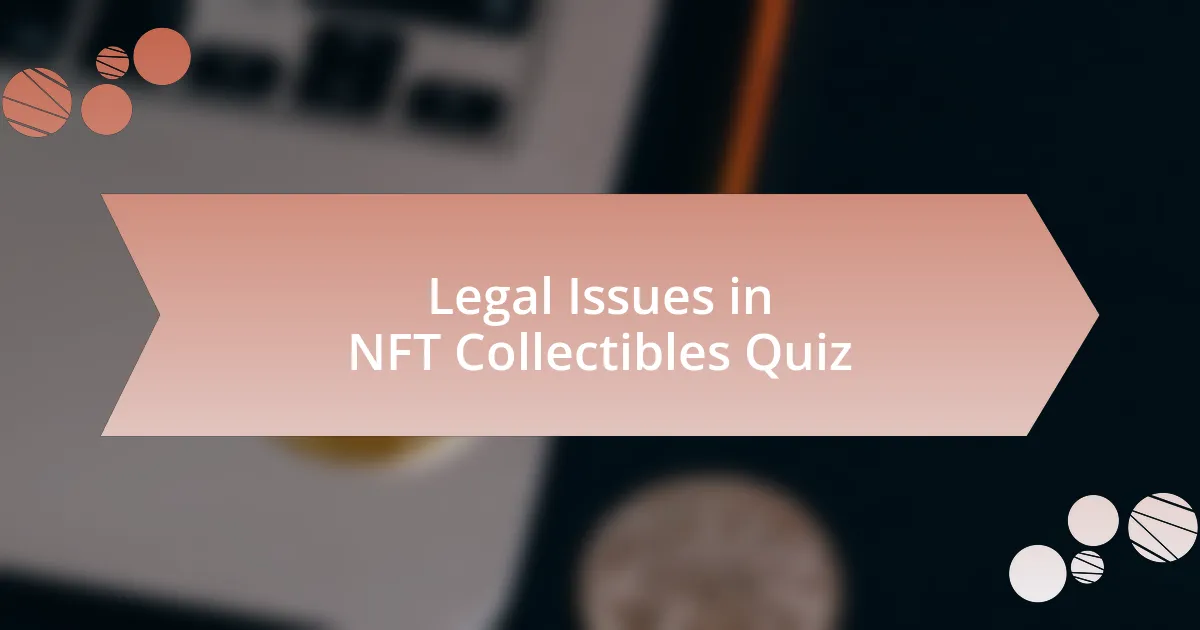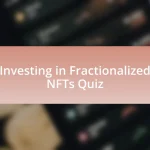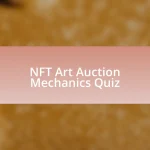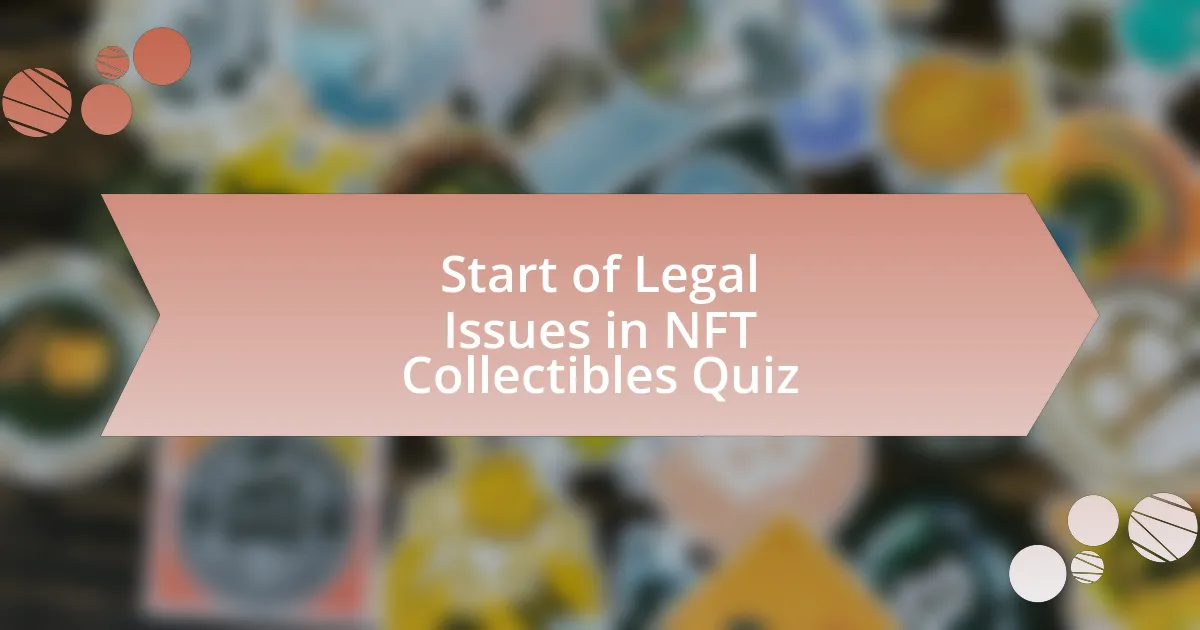
Start of Legal Issues in NFT Collectibles Quiz
1. What are the primary legal issues surrounding NFTs?
- Concerns revolve around network congestion and transaction fees, but not ownership.
- Issues include copyright and intellectual property rights, anti-money laundering regulations, and estate planning.
- Disagreements focus exclusively on market speculation and valuation fluctuations.
- Problems primarily consist of server downtime and digital ledger accuracy.
2. What is the significance of the case involving Amir Soleymani and Nifty Gateway?
- It is one of the first legal cases concerning NFTs, focusing on auction terms.
- It addressed anti-money laundering regulations in NFT sales.
- It involved a dispute over physical ownership of digital assets.
- It set a precedent for enforcing smart contracts in digital art.
3. What was the dispute in the case involving Free Holdings and McCoy/Sotheby’s?
- The dispute involved auction bids and pricing disagreements.
- The dispute was about the transfer of funds and payment methods.
- The dispute centered on ownership claims and false statements made during the sale of the NFT.
- The dispute revolved around contractual obligations unrelated to NFTs.
4. What is the main difference between fungible and non-fungible tokens?
- Both types of tokens are designed for unique digital assets.
- Fungible tokens are used for physical collectibles, while non-fungible tokens are not.
- Fungible tokens are interchangeable, while non-fungible tokens are unique.
- Non-fungible tokens share the same value as fungible tokens.
5. What are the potential legal issues for NFT creators?
- Potential issues include intellectual property infringement, false advertising, and privacy violations.
- Issues encompass trademark registration, employee benefits conflicts, and warranty violations.
- Legal matters include tax evasion, breach of fiduciary duty, and insider trading.
- Legal concerns involve housing regulations, consumer protection laws, and product recalls.
6. What happens if an NFT creator uses copyrighted material without permission?
- The creator can sell more NFTs without issue.
- The creator could face lawsuits for intellectual property infringement.
- The creator will be automatically fined for any mistakes.
- The creator will gain additional copyrights from the material used.
7. Can selling an NFT with false or misleading claims lead to legal trouble?
- No, it is always legal to make exaggerated claims.
- No, legal trouble is not possible in any case.
- Yes, it can lead to allegations of fraud and potential litigation.
- Yes, but only if the buyer is misled.
8. What is the role of the FTC in NFT-related legal issues?
- The FTC oversees the marketing strategies used by NFT creators.
- The FTC regulates the artistic quality of NFTs and their creators.
- The FTC can take over a business and repossess assets if there are allegations of fraud.
- The FTC handles all transactions involving digital currencies and cryptocurrencies.
9. What are some common legal considerations for NFTs?
- NFTs are exempt from any licensing and regulatory requirements in transactions.
- Common considerations include intellectual property rights, licensing issues, and regulatory compliance.
- There are no significant legal concerns unique to NFTs in the digital marketplace.
- Legal considerations do not include copyright claims or proprietary rights.
10. How do NFTs differ from traditional digital assets?
- NFTs are the same as traditional digital assets and can be easily exchanged.
- NFTs are unique and certified as one-of-a-kind, unlike traditional digital assets which are often fungible.
- NFTs are always free to create without any restrictions.
- NFTs are physical items that need storage like traditional collectibles.
11. What happens if an NFT buyer discovers that the NFT infringes on someone else’s rights?
- The buyer would automatically gain full ownership of the NFT.
- The buyer could receive a refund regardless of the situation.
- The buyer may lose the asset and the project creator could face costly IP disputes.
- The NFT would be returned to the original seller without consequences.
12. Can NFTs be adjacent to criminal activity?
- No, there is no connection between NFTs and crime.
- Yes, bad actors engaging in fraudulent activity via NFTs raise alarms.
- No, NFTs cannot be involved in any illegal activities.
- Yes, they are exclusively used for legal transactions.
13. What is the importance of engaging with trusted actors in the NFT space?
- It helps in creating more digital art.
- It is crucial to avoid legal issues and ensure legitimacy in transactions.
- It guarantees higher selling prices for NFTs.
- It allows for unlimited minting of NFTs.
14. What are some specific legal issues related to NFT ownership?
- Issues include disputes over ownership rights, particularly in cases where preexisting contracts did not contemplate NFTs.
- Legal issues center around NFT mining efficiency and energy consumption impacts.
- Concerns mainly involve digital display rights and social media promotion strategies.
- Problems typically relate to trader liquidity and NFT marketplace volatility.
15. How do courts handle disputes over NFT ownership?
- Courts rely solely on blockchain records to settle ownership disputes.
- Courts will automatically rule in favor of the highest bidder in an NFT sale.
- Courts always favor the original creator in NFT ownership disputes.
- Courts may reject claims if there is no concrete evidence of ownership or proprietary interest.
16. What is the significance of the Namecoin-Quantum dispute?
- It highlights the complexity of NFT ownership, particularly with expired names and re-registration issues.
- It focuses on environmental concerns related to blockchain mining processes.
- It concerns the valuation of NFTs in international marketplaces and their trends.
- It addresses cryptocurrency regulations on various exchanges and their impact.
17. Can an NFT creator get sued for selling an NFT?
- Yes, creators can face lawsuits depending on the circumstances, such as intellectual property infringement or false advertising.
- No, legal action cannot be taken against NFT creators under any circumstances.
- Yes, but only if the NFT is sold for a profit.
- No, NFT creators are immune to lawsuits for any reason.
18. What are some key questions for NFT creators regarding their activities?
- Creators should consider whether their activities may infringe others’ rights, such as trademarked brands or copyrighted material.
- Creators should prioritize finding the cheapest way to produce their NFTs regardless of legality.
- Creators need to focus solely on maximizing their profits without any legal concerns.
- Creators must only think about the aesthetic value of their NFTs for sales.
19. How do NFTs relate to anti-money laundering regulations?
- NFTs do not relate to financial regulations and are purely artistic.
- NFTs must comply with anti-money laundering regulations to avoid legal issues.
- NFTs are primarily used for tax evasion and cannot be regulated.
- NFTs are exempt from all financial regulations and can be traded freely.
20. What is the role of smart contracts in NFT disputes?
- Smart contracts can be a source of disputes if their terms are unclear or contested.
- Smart contracts eliminate the need for any legal agreements in NFT transactions.
- Smart contracts automatically resolve all disputes without need for intervention.
- Smart contracts ensure that all NFT disputes are settled in favor of the creator.
21. Can an NFT be considered a form of digital art?
- No, NFTs cannot represent ownership of art.
- Yes, NFTs can be considered a form of digital art.
- No, NFTs are purely financial assets.
- Yes, but only if they are animated.
22. What are some common disputes in the NFT space?
- Disputes often arise from issues like ownership claims, intellectual property infringement, and false advertising.
- Issues frequently relate to the aesthetics of digital artwork and community engagement.
- Conflicts primarily stem from digital wallet security and transaction speeds.
- Disagreements typically arise due to physical property valuation and taxation.
23. How do courts determine ownership in NFT disputes?
- Courts assess the market value of NFTs to resolve ownership disputes.
- Courts consider the creator`s intent for ownership determination in NFTs.
- Courts look for concrete evidence of ownership and proprietary interest to determine rightful ownership.
- Courts rely on witness testimonies to decide ownership in NFT disputes.
24. What is the significance of the court ruling in the Free Holdings case?
- The court rejected Free Holdings’ claims due to lack of standing and failure to state a claim.
- The court approved Free Holdings` claims without any conditions.
- The court dismissed the case on the grounds of jurisdiction issues.
- The court ordered Free Holdings to pay damages to McCoy/Sotheby’s.
25. Can an NFT creator collect personal information from buyers without consent?
- Yes, creators can automatically collect personal data without repercussions.
- Yes, consent is only necessary for financial transactions, not personal data.
- No, but only if the information is anonymized.
- No, collecting personal information without consent can lead to privacy violations and legal action.
26. What are some potential consequences for NFT creators who violate privacy laws?
- Creators could face legal action and potential fines for violating privacy laws.
- Creators can ignore any regulations regarding user information.
- Creators will receive rewards for innovative marketing strategies.
- Creators will be praised for increasing transparency in transactions.
27. How do NFTs impact estate planning?
- NFTs have no impact on estate planning since they are purely digital.
- NFTs eliminate the need for wills in estate planning entirely.
- NFTs introduce new complexities in estate planning due to their unique nature and potential for disputes.
- NFTs simplify estate planning by making asset transfer easier.
28. What are some key considerations for NFT collectors regarding legal issues?
- Collectors must rely solely on the opinions of social media influencers regarding NFTs.
- Collectors should only focus on the aesthetics of NFTs and disregard legal matters.
- Collectors should be aware of potential intellectual property issues and ensure they are buying from reputable sources.
- Collectors need to only check the price of the NFT before purchasing.
29. Can an NFT be considered a form of investment?
- No, NFTs are merely digital art without any investment potential.
- No, NFTs are not a form of investment at all.
- Yes, NFTs are guaranteed to provide significant returns.
- Yes, NFTs can be considered an investment, but they also come with unique legal risks.
30. What is the role of blockchain technology in NFT disputes?
- Blockchain technology is used to create NFTs but has no impact on disputes.
- Blockchain technology can provide evidence of ownership, but it does not automatically confer legal rights.
- Blockchain technology is irrelevant to the legal aspects of NFT ownership.
- Blockchain technology resolves NFT disputes through automatic arbitration.

Quiz Completed Successfully!
Congratulations on completing the quiz about Legal Issues in NFT Collectibles! Through this engaging experience, you’ve explored crucial legal concepts that govern NFTs, intellectual property rights, and the importance of compliance in this fast-evolving market. Whether you discovered new information or reinforced your existing knowledge, you are now better equipped to navigate the complexities of NFTs.
Quizzes like this not only test your understanding but also encourage critical thinking about real-world issues. You may have learned how various laws apply to digital assets, how to protect your own creations, and the potential risks involved in NFT transactions. Each question was designed to challenge your perspective and deepen your awareness of both opportunities and challenges in the NFT landscape.
If you’re eager to expand further, we invite you to check out the next section on this page. It contains more in-depth information on Legal Issues in NFT Collectibles. This additional resource will enhance your understanding and keep you informed about the latest developments in this exciting field. Dive in and keep learning!
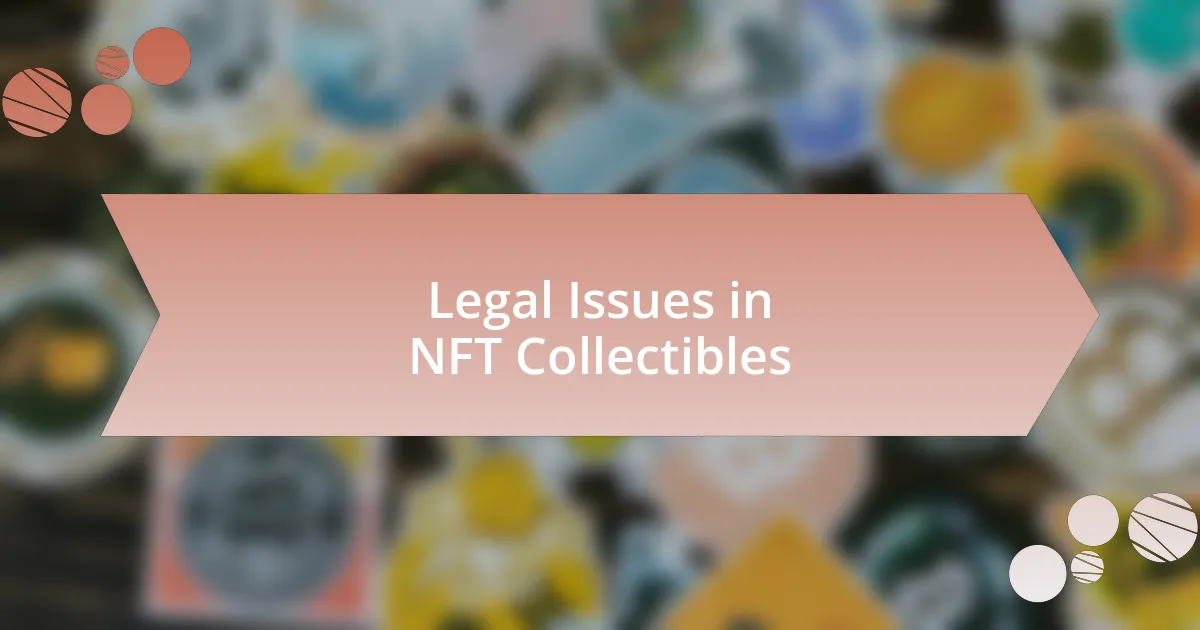
Legal Issues in NFT Collectibles
Overview of Legal Issues in NFT Collectibles
Legal issues surrounding NFT collectibles primarily involve intellectual property rights, consumer protection, and securities regulation. NFTs can represent digital ownership of art, music, and other creative works. Copyright law is crucial as it determines the rights associated with the underlying content. Without clear ownership, disputes often arise over who has the right to sell or license the NFT. Furthermore, NFTs can sometimes be considered securities, triggering compliance with relevant regulations. Understanding these complexities is essential for creators and collectors.
Intellectual Property Rights and NFTs
Intellectual property rights are paramount in the context of NFTs. Ownership of an NFT does not automatically confer copyright to the underlying asset. This can lead to confusion for buyers who assume acquiring an NFT grants them complete control. Creators must clearly communicate the rights associated with their NFT, outlining what buyers can and cannot do with it. Infringement cases may arise if unauthorized replication or sale occurs, highlighting the need for robust copyright claims within the NFT space.
Consumer Protection Concerns in NFT Markets
Consumer protection issues in NFT markets include fraud, misrepresentation, and lack of transparency. Buyers often face risks from deceptive practices, such as false claims about the uniqueness or value of NFTs. Regulatory bodies are increasingly focusing on ensuring that consumers are adequately informed before making purchases. Ensuring clear disclosures about the nature of the NFT and the risks involved helps mitigate these concerns. This focus aims to establish a safer environment for collectors and investors alike.
Securities Regulations Associated with NFTs
Securities regulations can apply to NFTs, especially if they are marketed as investment vehicles. If an NFT is deemed a security, it must comply with laws governing securities offerings, including registration and disclosure requirements. This classification depends on the nature of the investment and the expectations of the buyers. Regulatory scrutiny is growing, necessitating clear frameworks to determine if specific NFTs fall under securities law. Compliance with these regulations is crucial to avoid legal ramifications.
Challenges in Enforcing Legal Rights for NFTs
Enforcing legal rights for NFTs presents significant challenges due to the decentralized and often anonymous nature of blockchain technology. Jurisdictional issues complicate legal actions, as parties involved may reside in different countries. Additionally, decentralized marketplaces can obscure the identities of creators and buyers, making it difficult to pursue claims. The lack of established legal precedents in this rapidly evolving space further complicates enforcement efforts. Proper legal frameworks are essential for ensuring that rights can be effectively upheld.
What are the key legal issues related to NFT collectibles?
The key legal issues related to NFT collectibles include intellectual property rights, copyright infringement, consumer protection, and securities regulation. Intellectual property rights pertain to the ownership and use of the digital art associated with NFTs. Copyright infringement occurs when an NFT is created or sold without permission from the original artist. Consumer protection laws can be invoked when misrepresentation or fraud occurs in NFT transactions. Securities regulation is relevant if the NFT is classified as a security, implicating compliance with securities laws, as defined by the SEC.
How do copyright laws apply to NFT collectibles?
Copyright laws apply to NFT collectibles by governing the rights of creators regarding their digital art. When an NFT is minted, the copyright remains with the creator unless explicitly transferred. If an NFT is sold without appropriate rights, it can lead to copyright infringement. Copyright law provides creators with the exclusive rights to reproduce, distribute, and display their work, which is essential in the context of NFTs to protect their creative ownership.
Where can legal disputes regarding NFTs typically be resolved?
Legal disputes regarding NFTs can typically be resolved in both state and federal courts, depending on the nature of the claim. Issues concerning copyright or intellectual property are often handled in federal court due to the jurisdiction of federal copyright law. Alternatively, disputes may also be resolved through arbitration or mediation, especially if stipulated in the terms of service of the NFT marketplace. The jurisdiction depends on the parties involved and the specific legal issue at hand.
When is an NFT classified as a security?
An NFT is classified as a security when it meets the criteria set forth by the Howey Test, established by the U.S. Supreme Court. This test determines if an investment is considered a security based on whether it involves an investment of money in a common enterprise with an expectation of profit derived from the efforts of others. If NFTs are marketed and sold in a manner that emphasizes potential returns, they may fall under securities regulation, necessitating compliance with applicable laws.
Who is responsible for ensuring compliance with legal standards in NFT transactions?
The responsibility for ensuring compliance with legal standards in NFT transactions lies primarily with the creators and sellers of the NFTs. They must be aware of intellectual property rights and ensure they have permission to use any associated art. Additionally, NFT marketplaces also have a role in enforcing legal standards by implementing policies to prevent copyright infringement and protect consumers. Regulatory agencies may also oversee compliance with securities laws when applicable.

